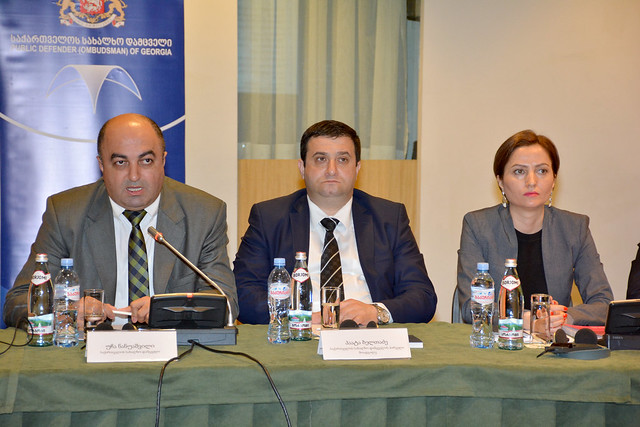Short Version of Public Defender’s Parliamentary Report
On 16 May, 2016, the Public Defender of Georgia presented a short version of the parliamentaryreport to representatives of the diplomatic corps, the government, international and non-governmental organizations. The report reflects past year’s positive and negative trends in terms of human rights situation.
34 chapters of the parliamentaryreport cover a wide range of civil, political, economic, social and cultural rights and bring together the basic recommendations prepared for the government branches, timely and effective implementation of which would largely contribute to the establishment of high standards of human rights in the country.
2015 was distinguished by important events: Georgia was elected as a member of the UN Human Rights Council at the UN General Assembly plenary session; the International Criminal Court authorized to initiate an investigation into the alleged war crimes and crimes against humanity in relation to the August 2008 armed conflict in Georgia.
The Government of Georgia carried out reforms in the judiciary and law-enforcement systems; one of the major achievements was liberalization of criminal policy in the area of human rights, including adoption of the Juvenile Justice Code and the amendments made to the Criminal Code regarding the rules of questioning of witnesses. However, there are still a number of challenges to be overcome in order to increase confidence in the court; the process of promotion and appointment of judges in the Supreme Council of Justice was particularly alarming.
Investigation of thousands of prisoners’ complaints on torture, inhuman and degrading treatment is still pending; effective investigation of alleged ill-treatment committed in police stations and penitentiary facilities remains a problem; Public Defender’s recommendations on retention of surveillance camera recordings for a reasonable period and the closure of penitentiary facility No 7 have not been fulfilled.
Ill-treatment of detainees by police officers was critical in 2015; performance of the Prosecutor’s Office of Georgia remained ineffective in terms of the investigation of crimes of torture, inhuman and degrading treatment, and punishment of perpetrators.
Violation of the right to privacy was a problem. The syndrome of impunity and ineffective investigation of similar crimes stimulated new crimes. No legal mechanism has been created that would allow stakeholders to revise the already enacted decisions, including restitution of property and moral compensation for moral damage caused by illegal conviction.
There were a few manifestations, where the state failed to ensure the constitutionally guaranteed right to peaceful demonstration, and/or unduly restricted the freedom of assembly. Diverse media environment was generally ensured during the year. However, at the end of the year, problems arose with regard to maintenance of healthy media environment and unjustified interference with the freedom of expression by court during the judicial dispute over Rustavi 2 TV.
Absence of minimum standards of labour safety and an alarming number of casualties in the workplace were crucial problems.
Achieving gender equality remained a problem in the country. The Council of Europe Convention of 2011 “on preventing and combating violence against women and domestic violence” (Istanbul Convention) has not been ratified by the Government so far. Homophobic attitudes towards LGBT persons, as well as timely and effective investigation of hate crimes, remain problematic. The gaps in the Law on Elimination of all Forms of Discrimination create a real obstacle for the Public Defender to effectively carry out monitoring.
One of the most pressing issues was realization of the right to live in a healthy environment, which was further complicated by low quality of provision of timely information to population and engagement of stakeholders in the important projects.
High rates of child mortality and poverty, unavailability of public health services and tolerance of the society towards violence against children were alarming. The situation is particularly difficult in the mountainous regions. In addition, acute problems were observed in children’s group homes and boarding schools under religious organizations. The problem of separate placement of juvenile prisoners from adult prisoners was still urgent.
The full enjoyment of freedom of religion was still complicated. The level of participation and involvement of national minorities in the decision-making process was low.
Another problem was the absence of database of homeless persons, which is why it is difficult to define the number of people in need of financial assistance; socio-economic conditions of the residents of mountainous regions are particularly alarming; rights of conflict-affected population were violated; resettlement of IDPs, dangerous living conditions and the situation of tens of thousands of disaster-affected families need urgent attention; the situation of asylum seekers, refugees and persons with humanitarian status is deplorable; return of Meskhetians, expatriated from southern Georgia, is still a topic of discussion.
Creation of an adequate environment for full development of persons with disabilities, as well as the poverty, homelessness and the danger of isolation of the older persons, remains one of the most important challenges for the state.
A number of problems were reported in terms of rights situation of recruits and military personnel, as well as of military and war veterans. Herein, it should be noted that mandatory military servants are mainly used for security services and, in fact, no military or physical trainings are held for them. Accordingly, it is necessary to improve the system of compulsory military service.
See the electronic version of the report
















